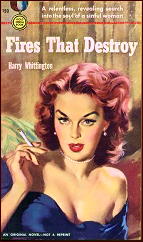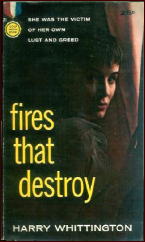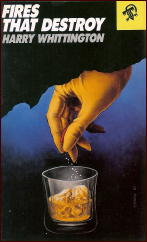Thu 10 Dec 2009
Reviewed by Mike Dennis: HARRY WHITTINGTON – Fires That Destroy.
Posted by Steve under Reviews[10] Comments

HARRY WHITTINGTON – Fires That Destroy. Gold Medal #190, paperback original; 1st printing, 1951; 2nd printing: #831, 1958. Reprint paperback: Black Lizard, 1988.
Some guys have all the luck. Blondes have more fun. You’ve heard the cliches. But at the faceless corporation where Bernice Harper works, pretty girls get all the promotions.
And it pisses her off.
That’s the central theme in Fires That Destroy, a tight little noir novel from 1951 by Harry Whittington.
Year in and year out, she watches through her thick-lensed glasses as sexy babes in tight skirts use their attributes to glide effortlessly up the ladder while Bernice, plain and stringy-haired, stays mired in the steno pool.

She builds up a reservoir of resentment, which eventually morphs into self-hatred when her boss recommends her for the position of private secretary in the home of an important client. Problem is, he’s blind.
She knows they foisted her off on a blind man, almost as a joke, and she doesn’t like it. Things are made worse when she learns he’s a heavy drinker who never tires of making passes. This intensifies her hatred, as she knows that he wouldn’t come near her if he could see.
And so begins her descent into hell.
The novel actually opens with Bernice looking down a staircase at the blind man’s twisted corpse. She’s just pushed him down the stairs to his death. In the dark silence of the house, a grandfather clock chimes, freaking her out. She thinks, “The sound of a clock and I’m paralyzed. How will I stand the rest of it?”

Not very well, actually. Whittington ratchets up the stakes for Bernice in nearly every scene. But she’s so consumed by her hateful obsession with the world she inhabits that she can’t rescue herself. Her unraveling forms the spine of the story.
In a masterful stroke, Whittington takes the reader deep into Bernice’s mind, as she slowly disintegrates into “the most depraved and sinful woman on the face of the earth.” Her interior dialogue with herself evokes Jim Thompson at his most dangerous.
Whittington wrote over 170 novels in his astonishing career, hopping around through various genres. Most of his work, unfortunately, is out of print, but noir aficionados should make a point of locating a copy of Fires That Destroy.
December 10th, 2009 at 10:35 pm
I’m not a big Whittington fan, but there is no denying that he did this kind of book well. For me he lacks the obsessive touch that marks the best of the noir paperback writers, but for sheer professionalism he’s hard to beat.
December 11th, 2009 at 12:40 am
I’ve not read all that many Whittington books, and I’ve never been able to say exactly why. His work is fairly highly regarded, and it seems to have all the trappings (*) of good noir fiction, as Mike says about FIRES THAT DESTROY.
But when, David, you say he “lacks the obsessive touch the marks the best of the noir paperback writers,” you’ve put a finger on something. He’s there and he’s not quite there. To me, that is, and I could easily be persuaded that I’m wrong.
(*) I suppose I could use the word “tropes” here, but I refuse. To me trope sounds like the past tense of tripe.
Other Whittington books reviewed on this blog:
WHIT HARRISON – Strip the Town Naked (by Geoff Bradley)
https://mysteryfile.com/blog/?p=1570
and
WHIT HARRISON – Body and Passion (by Dan Stumpf)
https://mysteryfile.com/blog/?p=1346
December 11th, 2009 at 8:07 am
Since Whittington wrote around 200 paperback novels, the overall quality is all over the place. A few I’ve liked and others I did not care for at all. I looked on Wikipedia and was stunned to see him called “King of the Pulps” along with H. Bedford Jones.
Of course this is absolute nonsense. Bedford Jones deserves the title, but I could not even remember Whittington being in the pulps. I looked at the FictionMags Index and see that he did have a few stories in Mammoth Western and one in Exciting Western in the early 1950’s.
I’ve heard him called King of the Paperbacks and I guess this what the Wikepedia entry is referring to. Nowadays “pulp” is used in reference to not just the actual pulp magazines of the 1900-1955 period, but for all sorts of paperbacks, sleaze, porno, romance, men’s adventure, you name it.
December 11th, 2009 at 8:57 am
Bedford-Jones officially (as a sort of semi-joke) passed the title king of the pulps onto Erle Stanley Gardner towards the end of his career. I think he even gave Gardner a certificate.
As for Whittington, I don’t think I would even grant him king of the paperbacks, but that isn’t a knock of his best work, just for me he doesn’t have the qualities of the best of the paperback writers. Like Steve I just haven’t read that many or been that impressed. Not the way some of the others stick in my mind.
December 11th, 2009 at 11:27 am
Speaking of “King” this or that, I was friendly with Mike Avallone during his later years and he visited me quite a few times. He called himself “The fastest typewriter in the East” and was right up there with Whittington as far as books published. Come to think of it he was up, or down there, with Whittington as far as the quality also!
December 11th, 2009 at 3:57 pm
When I asked Mike which of the three covers he preferred, he (not surprisingly) chose my favorite too: Number One.
December 11th, 2009 at 4:32 pm
David, when you say that Whittington lacks the obsessive touch that the best noir writers had, do you think that was due to his tremendous output? I mean, a guy who writes seven novels in one month can’t be expected to engage his inner editor for any length of time. Whittington himself as much as admitted that he just cranked these books out for cash flow.
December 11th, 2009 at 10:14 pm
Mike
I don’t know enough about Whittington to say for sure, but based on his themes he seems to lack the obsession common in many of the better paperback writers. It may be due to how prolific he was, but some fairly prolific writers were still obsessive. Whittington in some ways reminds me more of some of the pulp writers who moved on into paperbacks like Norman Daniels, skilled professionals, but without that edge that marked a Thompson, a Goodis, or even John D. MacDonald.
That isn’t a knock of Whittington’s work, but it may explain why I don’t respond to him like some of the others. There is an individuality missing in his work that I’ve read that raises the others above the medium and into a slightly different category.
I can’t quite put my finger on it, and that may be the reason right there. With so many of the others there is an almost personal touch to their works and themes that is identifiable under any name they use, but not in Whittington. He seems to me to fall somewhere between the really good writers like MacDonald and the really obsessed writers like Goodis — six of one, half a dozen of the other. Neither fish nor fowl.
I suppose I’m saying for me Whittington seems to write noir because it sells, not because he has to write it.
December 13th, 2009 at 1:30 pm
I have a feeling that if Whittington had been able to publish all of his work at Gold Medal, with (I’m going to assume) better editorial input (and here’s another big assumption) better pay, his reputation would be as high as the other major Gold Medal writers.
None of his books in the Gold Medal series that I’ve read so far have been bad books; most have have been very very good. I wish that I’ve read more of them.
It’s when you venture into his work for other publishers that I think you’ll find the unevenness and lack of passion that seems to be attached to his name.
— Steve
December 13th, 2009 at 5:13 pm
Steve
Your point is well taken, but then MacDonald’s work at Dell or Thompson at Lion, or Goodis hardcovers aren’t significantly different from their Gold Medal books. Maybe Whittington needed a firmer hand or perhaps GM gave him more time or leeway, but while GM certainly inspired their writers most of the good ones did equal work for other publishers (Hamilton, Albert, Marlowe, Prather, Fisher …).
Whittington is a good writer, but something is missing that marked the better paperback original writers, and I think it may just be that distinctive voice or obsession. He’s by no means a bland writer, but he isn’t a distinctive one either. To be honest most of Whittington’s books are forgotten once read which isn’t true of many of the better paperback writers even if Whittington might have sometimes been a better writer technically.
Walker
Avallone is certainly prolific and as certainly uneven, but even the least of his works are marked by his own peculiar genius and the way he had with a phrase. Still, whether he was king of the paperbacks or not he was still king of the adaptations. I would rank him higher than Whittington simply because he is almost always fun to read — even when he is off his game.